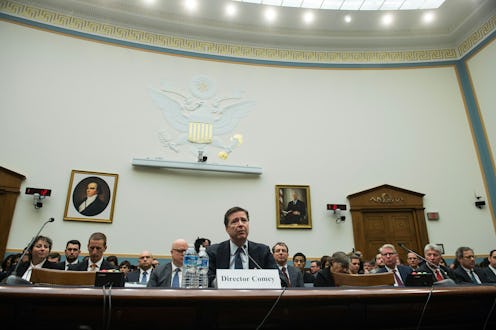News
The FBI's Cone Of Silence Has Fallen
In the wake of his somewhat vague letter sent to Congress on Friday referring to new emails that could potentially relate to the investigation into Hillary Clinton's email server, FBI Director James Comey has been widely criticized — not just from Democrats, but from longtime Republicans too — for going against usual Justice Department norms and taking public action that could influence an election shortly before voting.
The criticism has gotten so bad that it's even coming from inside the house. NBC News reported that officials at the Justice Department urged Comey not to send the letter, and The Washington Post obtained a second letter Comey sent to his employees at the FBI clarifying his actions with regards to Congress. We found out on Sunday via the Wall Street Journal that there were over 650,000 emails on Anthony Weiner's computer that need to be reviewed, and that there have been disagreements within the FBI over the Clinton email server investigation. Later that day, it was reported that the FBI had obtained a warrant to search emails on Weiner's computer in connection to the Clinton probe.
In other words, the FBI, one of the most deliberately opaque and publicity-averse parts of the government, is now leaking like a busted canoe. We are seeing an unprecedented situation, where employees of an investigative agency with a policy of not commenting at all on ongoing investigations seemingly feel free to tell reporters precise details of their searches and of disagreements within the agency.
It is unclear whether this is because the FBI is giving clearance to employees to reveal information to clarify matters; whether this is a symptom of the feud within Justice over the handling of the investigation; whether employees are upset with Comey about a letter they see as misleading; or likely some confluence of all of these factors. But the nonstop leaks coming out of offices that require professional discretion highlight exactly why election-adjacent actions like Comey's surprise letter are so frowned upon in law enforcement.
In the wake of revelations about the Clinton email investigation, we've also learned about other investigations that the FBI had previously kept out of the public eye. The Wall Street Journal story about feuds within the FBI also revealed that there had been months of probes into the Clinton Foundation, which have not resulted yet in any public statements or charges. CNBC reported that Comey wanted to keep the FBI off of a letter from the U.S. Intelligence Community tying Russia to hacked emails for fear of becoming too involved in the U.S. election. After Senator Harry Reid claimed that the FBI had investigated Donald Trump's ties to the Russian government, The New York Times reported that such an investigation in fact existed, but that the FBI had found no clear link between Trump and the Kremlin. NBC News reported that the FBI nevertheless continues to investigate Trump's former campaign manager, Paul Manafort, for ties to Russian and Ukrainian oligarchs.
This is not how elections should work. The result of the presidential election should not be based on spin of anonymous leaks from law enforcement officials about their incomplete investigations. This is why the Bureau doesn't normally comment. We're seeing what happens when norms fail.
